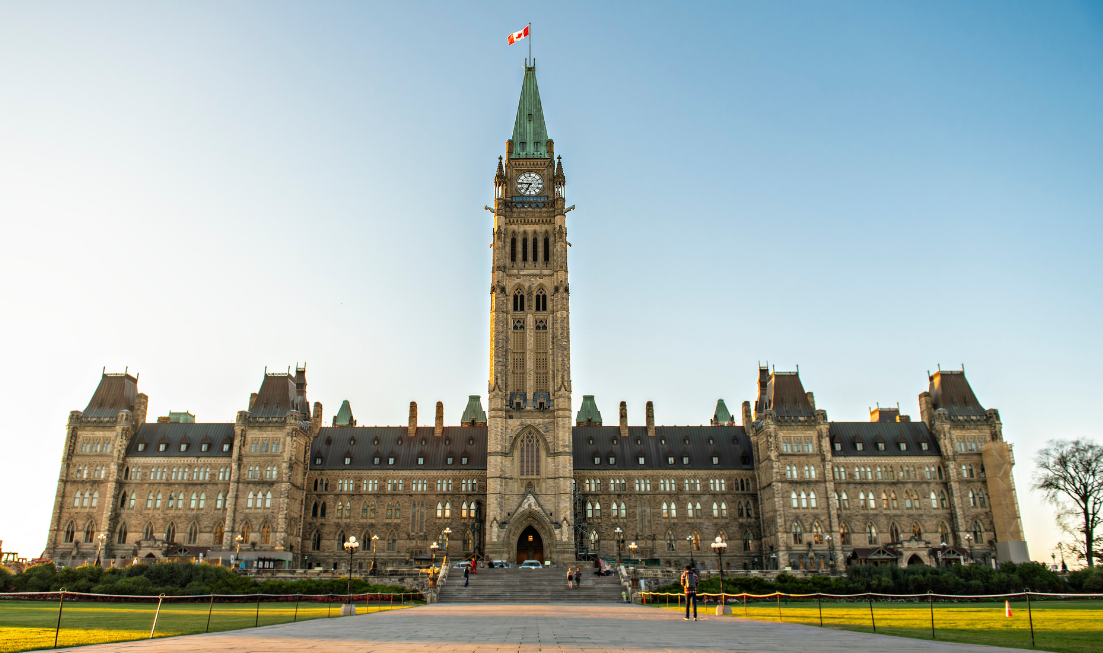Despite appearances, Canadian politicians are getting stuff done, expert says

It's an eventful and seemingly dysfunctional time in politics, but one Canadians shouldn’t ignore, explains political science professor Andrea Lawlor.
November 28, 2024
Between questions about Prime Minister Justin Trudeau’s political future, non-confidence motions, election talk and heated exchanges in Parliament, it’s been an eventful fall for Canadian politics.

For the average Canadian, who gets a glimpse of government through the media, Parliament looks increasingly dysfunctional, says Andrea Lawlor, an associate professor in the department of Political Science.
Lawlor shares her insights on Canadian politics, the effect of the U.S. election, and why Canadians should resist tuning it all out.
Looking in from the outside, it could appear things are quite unstable on Parliament Hill. What do you think?
There’s been a lot of conversation around whether the tone and tenor of the debate in Parliament has been become more negative, more toxic, more inflammatory. I think there is evidence of that, in part, because of the individual personalities in Parliament, but also because there is a perceived strategic advantage in attacking the Liberal government at present.
From where Canadians are sitting, federal politics looks like an environment where politics does not appear to be working. I’m hesitant to say that this is particularly unique.
I think if we look across the last 20, 40, 50 years, we see lots of evidence of Parliament coming to these moments of heightened conflict that are not what we’d prefer in terms of parliamentary behaviour or civil discourse.
How do you think the re-election of Donald Trump impacts our political parties?
Some new parameters around election preferences have entered the conversation over the last few weeks — namely, what kind of government do Canadians want in place to negotiate with the upcoming Trump administration?
I don’t think any party has a distinct advantage in governing alongside a presidency that has already signalled a departure from usual friendly relations with Canada as it relates to our interests on a broad range of areas from trade to defence to migration.
But Canadians will have to decide which set of values and policy priorities it wants to advance in upcoming bilateral and multilateral negotiations with the U.S.
What about internally for the Liberals? It seems like Justin Trudeau is going to stay on as leader, despite calls for him to step down.
There are two schools of thought on Justin Trudeau staying on as leader.
The first is that when you have a leader who is not doing well in the polls in terms of their own popularity and you’re concluding almost 10 years in government, that leader should “go down with the ship.”
In other words, they should wear the responsibility for the decline in the government’s popularity in the next election.
This is particularly true in an environment like ours, where politics is very leader-centred. Any electoral loss should not be put on the shoulders of a new leader, and we’ve seen evidence where new leaders suffer the spillover of unpopularity from the last leader.
There are more and more conversations, though, that in a general polling environment where Canadians seem to want some political change but aren’t necessarily overwhelmed by the current leader of the opposition, a new leader — whether it is Christy Clark, Mark Carney or someone else in the Liberal Party bubble — could renew some of the interest in the Liberals.
In this view, a new party leader might not be able to win again but could minimize losses to the party’s seat count.
Trudeau has certainly signaled that he has no intention to step down — even after a very difficult caucus meeting at the end of October. But we saw U.S. President Joe Biden signal quite openly that he had no intention of stepping down — until he did. I think probably even some of the prime minister’s most inner circle really don’t know what he will choose to do or when.
The choice does remain his, as party leader, under our current system, and the only thing likely to pressure him enough to step away is Liberal members of Parliament resigning their membership in the party and sitting as Independents — and that does not look likely.
Is it all politicking or is there work getting done on Parliament Hill?
Interestingly, this is one of the move active moments in this parliament in terms of legislation! There are a lot of interesting and important public bills on the table right now, including several around digital media, foreign interference and strengthening election rules.
If Parliament does fall, they will either have to be reintroduced in the next parliamentary session or will simply die on the order paper.
We often think about elections in terms of the polling numbers or the excitement around personalities and will we see big shifts in the composition of the House of Commons.
I think what is really important for Canadians to focus on is the work of Parliament and what it can get done in whatever time it has remaining because — regardless of whether the next election is this winter, spring or not until the fall — the clock is running down.
When do you think we can expect a federal election?
A spring election, I think, is quite possible. And we did have a January election in 2006, so that’s not out of the question either.
The likelihood of us going to the polls before then will really depend on when the other parties think they can maximize their vote.
The Conservatives, I think, will always be ready because they’re well-resourced and their leader is certainly polling better than the other leaders, so it’s currently going to be to their advantage.
The NDP don’t really want to go to an election right now, for a few reasons: They’re polling at levels that are stable for them — 17 to 19 per cent. So they would be going through all the trouble of an election for probably not a lot of change, and possibly even the loss of a few seats.
The second reason is that unlike all the other parties, the NDP is a networked party between the federal NDP and the provincial NDP. They are one big (mostly) cohesive unit, which means that their resources have been depleted because of the B.C. and New Brunswick provincial elections.
The Bloc, it’s fair to say, could go any time, but they will look to maximize their own strategic advantage. Currently, they’re poised to do well in Quebec, and we saw evidence of that in the recent La Salle-Émard-Verdun by-election, where they eked out a surprise win.


